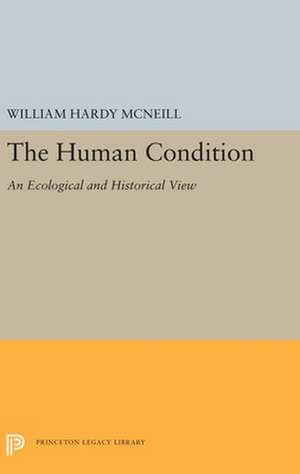The Human Condition – An Ecological and Historical View: Princeton Legacy Library
Autor William Hardy Mcneillen Limba Engleză Hardback – 29 iun 2020
The author identifies three landmarks of human ecological history when systematic changes in the balances between microparasites and macroparasites occured: the advance of our ancestors to the apex of the food chain, the human penetration of the colder and dryer zones of the earth, and the establishment of the agriculture. In an espeically revealing discussion of this last landmark, he shows how human efforts to achieve successful farming increased human vulnerability to infection. Irrigation and the use of the plow created sewage and water supply problems that in turn brought on new and intensified forms of parasites. In addition, food harvested and store for use throughout the year became vulnerable to rats, mice, insects, and molds.
These advances not only increased the number and variety of microparasites; they also opened the way for macroparasites, that is, the transfer of food by those who produce it to those who produce it to those who consume it without themselves having worked in the fields. What then began as a symbiotic relationship quickly became an exploitative one. As the author points out, the high yield and dependability of irrigation plowing tied farmers to the land quite effectually and made such populations easy targets for tax and rent collectors. Hence human society in its civilized form came to be fundamentally divided between hosts and parasites, the ruled and the rulers.
Against this conceptual background of the enveloping balances between microparasites and macroparasites that have limited human access to food and energy, Profesor McNeill draws a new historical picture of the human condition. In doing so, he considers the development of command versus market economics in the mobilization of human and material resources, and speculates about the direction in which these resources are coordinated today.
William H. McNeill is Robert A. Millikan Distinguished Service Professor of History at the University of Chicago.
Originally published in 1980. The Princeton Legacy Library uses the latest print-on-demand technology to again make available previously out-of-print books from the distinguished backlist of Princeton University Press. These editions preserve the original texts of these important books while presenting them in durable paperback and hardcover editions. The goal of the Princeton Legacy Library is to vastly increase access to the rich scholarly heritage found in the thousands of books published by Princeton University Press since its founding in 1905.
| Toate formatele și edițiile | Preț | Express |
|---|---|---|
| Paperback (1) | 265.36 lei 6-8 săpt. | |
| Princeton University Press – 19 sep 2019 | 265.36 lei 6-8 săpt. | |
| Hardback (1) | 531.53 lei 6-8 săpt. | |
| Princeton University Press – 29 iun 2020 | 531.53 lei 6-8 săpt. |
Din seria Princeton Legacy Library
-
 Preț: 437.79 lei
Preț: 437.79 lei - 16%
 Preț: 2324.11 lei
Preț: 2324.11 lei -
 Preț: 223.24 lei
Preț: 223.24 lei -
 Preț: 313.18 lei
Preț: 313.18 lei - 23%
 Preț: 780.26 lei
Preț: 780.26 lei -
 Preț: 376.99 lei
Preț: 376.99 lei - 16%
 Preț: 915.48 lei
Preț: 915.48 lei -
 Preț: 377.31 lei
Preț: 377.31 lei - 16%
 Preț: 882.80 lei
Preț: 882.80 lei - 16%
 Preț: 736.40 lei
Preț: 736.40 lei - 16%
 Preț: 860.09 lei
Preț: 860.09 lei -
 Preț: 340.11 lei
Preț: 340.11 lei -
 Preț: 362.12 lei
Preț: 362.12 lei - 16%
 Preț: 683.63 lei
Preț: 683.63 lei -
 Preț: 363.10 lei
Preț: 363.10 lei -
 Preț: 172.27 lei
Preț: 172.27 lei -
 Preț: 340.22 lei
Preț: 340.22 lei - 16%
 Preț: 835.12 lei
Preț: 835.12 lei -
 Preț: 266.84 lei
Preț: 266.84 lei -
 Preț: 317.65 lei
Preț: 317.65 lei -
 Preț: 329.09 lei
Preț: 329.09 lei -
 Preț: 265.73 lei
Preț: 265.73 lei -
 Preț: 260.54 lei
Preț: 260.54 lei -
 Preț: 314.84 lei
Preț: 314.84 lei -
 Preț: 402.66 lei
Preț: 402.66 lei -
 Preț: 464.18 lei
Preț: 464.18 lei -
 Preț: 351.09 lei
Preț: 351.09 lei -
 Preț: 483.81 lei
Preț: 483.81 lei - 19%
 Preț: 500.29 lei
Preț: 500.29 lei -
 Preț: 388.44 lei
Preț: 388.44 lei -
 Preț: 328.48 lei
Preț: 328.48 lei - 23%
 Preț: 742.04 lei
Preț: 742.04 lei -
 Preț: 372.92 lei
Preț: 372.92 lei -
 Preț: 328.70 lei
Preț: 328.70 lei - 19%
 Preț: 505.89 lei
Preț: 505.89 lei -
 Preț: 289.17 lei
Preț: 289.17 lei -
 Preț: 446.25 lei
Preț: 446.25 lei - 19%
 Preț: 575.53 lei
Preț: 575.53 lei -
 Preț: 447.20 lei
Preț: 447.20 lei -
 Preț: 484.19 lei
Preț: 484.19 lei -
 Preț: 271.12 lei
Preț: 271.12 lei -
 Preț: 314.46 lei
Preț: 314.46 lei -
 Preț: 362.51 lei
Preț: 362.51 lei -
 Preț: 307.07 lei
Preț: 307.07 lei - 19%
 Preț: 498.46 lei
Preț: 498.46 lei -
 Preț: 272.27 lei
Preț: 272.27 lei - 19%
 Preț: 458.44 lei
Preț: 458.44 lei -
 Preț: 406.20 lei
Preț: 406.20 lei - 19%
 Preț: 515.73 lei
Preț: 515.73 lei -
 Preț: 428.88 lei
Preț: 428.88 lei
Preț: 531.53 lei
Preț vechi: 656.21 lei
-19% Nou
Puncte Express: 797
Preț estimativ în valută:
101.74€ • 110.55$ • 85.52£
101.74€ • 110.55$ • 85.52£
Carte tipărită la comandă
Livrare economică 21 aprilie-05 mai
Preluare comenzi: 021 569.72.76
Specificații
ISBN-13: 9780691657097
ISBN-10: 0691657092
Pagini: 96
Dimensiuni: 164 x 240 x 12 mm
Greutate: 0.31 kg
Editura: Princeton University Press
Seria Princeton Legacy Library
ISBN-10: 0691657092
Pagini: 96
Dimensiuni: 164 x 240 x 12 mm
Greutate: 0.31 kg
Editura: Princeton University Press
Seria Princeton Legacy Library
